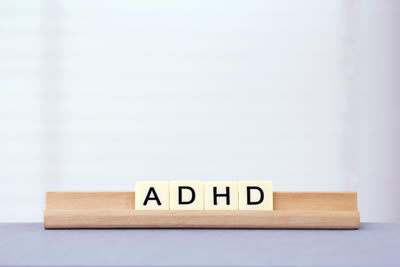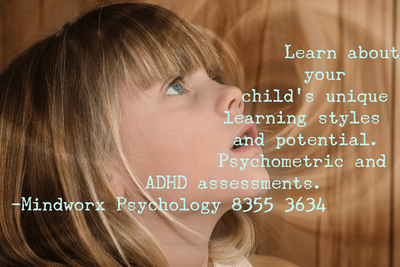ADHD
Help for attention and impulsivity problems
Help For Attention-Deficit Hyperactivity Disorder (ADHD)
ADHD (Attention deficit hyperactivity disorder) in children is a natural variation in how their brains function, affecting attention, impulse control, executive functioning, energy and emotional regulation. At Mindworx Psychology, we take a neuro-affirming approach to providing help for ADHD – recognising that it is not a disorder to be “fixed” but a natural variation in how brains function.
ADHD impacts the whole family and a child or teens relationships. Instead of seeing differences as deficits, we focus on understanding needs through testing, and supporting strengths while helping individuals develop strategies that work for them.
What ADHD Can Look Like in Children
Children with ADHD may experience differences in attention, impulsivity, hyperactivity, and emotional regulation. Some children primarily struggle with focus, while others have higher energy levels, and some experience both.
Every child with ADHD is unique, and their experience of the world may differ from others. Recognising and supporting these differences can have a profound impact on their functioning, allowing them to thrive.
Signs can include:
- Difficulty staying focused, following instructions, or completing tasks
- Frequent fidgeting, restlessness, or trouble staying seated
- Impulsive behaviours, such as blurting out answers or interrupting conversations
- Emotional sensitivity, big reactions, and difficulty regulating emotions
What ADHD Support Looks Like at Mindworx Psychology
Early identification of ADHD can make a significant difference in your child’s well-being and success. Once ADHD is identified, we offer ongoing support and interventions tailored to your child’s unique strengths and challenges. Our neuro-affirming and trauma informed psychologists can help with:
- Executive Function Coaching – Teaching organisation, time management, and self-regulation skills
- Emotional Regulation Strategies – Helping children manage frustration, anxiety, and impulsivity
- School Support & Accommodations – Guidance on adjustments for the classroom and learning plans
- Parent Coaching – Practical tools to help you support and advocate for your child
- Social & Behavioural Skills– Developing skills for positive relationships and self-confidence
While many children occasionally display challenging behaviours, ADHD is a persistent pattern that significantly impacts daily life. Previously referred to as Attention Deficit Disorder (ADD), ADHD is now categorised as three presentations:
Does my child have ADHD?
It’s important to know that no single test can diagnose a child as having ADHD. Although your child may appear to have symptoms consistent with ADHD, it is important to complete a full assessment, which may involve (with parental consent) your psychologist liaising with your school, your paediatrician and/or your G.P.
Assessment is much more than just filling out a questionnaire. While questionnaires are useful screening tools, they do not provide a diagnosis – they simply highlight potential symptoms.
A comprehensive ADHD assessment involves ruling out other factors that can contribute to ADHD-like symptoms, such as:
- Vision or hearing difficulties that affect attention and focus
- Anxiety or emotional regulation challenges that mimic inattention
- Sleep problems that impact energy and concentration
- Parenting styles or environmental factors influencing behaviour
- Learning difficulties that may be mistaken for ADHD
By taking a thorough, evidence-based approach, we ensure that any diagnosis is accurate, helping your child receive the right support and strategies to thrive.
Why Early Support Matters
Children with ADHD often face frequent criticism, even when they are trying their best. Without understanding and support, this can impact self-esteem and relationships.
Early intervention can help by:
- Providing evidence-based strategies to support focus, emotional regulation, and executive functioning
- Helping parents and teachers understand how ADHD works and how to support their child
- Building confidence in children so they can flourish, not just cope
With the right support, children with ADHD can thrive in their own unique way.
ADHD is not a flaw -it’s a different way of experiencing the world. It is part of neurodiversity, the natural variation in how brains work. At Mindworx Psychology, we believe that neurodivergent minds are valuable, and differences should be understood and supported – not “fixed.”
If you’d like to learn more about ADHD or explore how we can support your child, get in touch with us today, or join our online program, Parenting An ADHDer. Ready for change? We are ready to help.
Flexible ADHD Testing and Support Options
ADHD Testing
At Mindworx Psychology, we understand that every child is unique – there’s no one-size-fits-all approach when it comes to ADHD support. Whether you’re seeking a formal diagnosis, guidance for school accommodations, or strategies to help your child at home, we provide personalised solutions designed to meet your family’s needs.
We work to industry gold standards, but equally – we won’t write or charge for extensive reports, or conduct a battery of tests if you don’t need them.
A personal approach:
FORMAL ADHD DIAGNOSIS: If you need a formal ADHD diagnosis, we conduct a full assessment using validated tools to determine whether your child meets diagnostic criteria. This includes in-depth testing, a detailed report, and practical recommendations to support your child at home and in school.
TREATMENT AND SUPPORT: If your focus is treatment and support, we can screen for ADHD and make a provisional diagnosis based on clinical observations. This allows us to begin therapy and provide strategies to improve focus, emotional regulation, and behaviour – without unnecessary assessments or costs.
We’ll discuss your specific goals and concerns to determine what level of testing or support is most helpful and relevant for your child.
TIPS FOR PARENTING CHILDREN WITH ADHD
ROUTINES
Try to keep the same routine every day, from wake-up time to bedtime. Use visual reminders.
Include time for homework, outdoor play, and indoor activities – and allow extra time to reduce stress.
Keep copies of your schedule on the fridge, or on a bulletin board in the kitchen.
ORGANISE EVERYDAY ITEMS
Have a place for everything, and keep everything in its place. This includes clothing, backpacks, and toys.
Use age appropriate labels and pictures.
Encourage children to complete tasks e.g. part of taking off shoes is putting them away in the right place
BE CLEAR AND CONSISTENT
Children with ADHD need consistent rules they can understand and follow.
Having a neuro-atypical brain means that routines can be more challenging to learn. Make it easier by being as consistent as possible.
GIVE PRAISE OR REWARDS WHEN RULES ARE FOLLOWED
Children with ADHD often receive a lot of criticism, even when they may be trying their best.
Look for good behaviour, and praise it. Don’t wait for perfect, praise the attempt, praise the effort.
BE KIND TO YOURSELF !
Parenting children with ADHD can be filled with joy, and it can also be complex, challenging, frustrating and demanding!
Make it a priority to build in time for yourself to recharge and refresh, even if it is just a five minute walk each day.
GET PROFESSIONAL SUPPORT
It is important that children learn how to successfully master tasks. This can’t happen if they are placed in situations they are not able to cope with.
Professional advice can help you understand exactly what your child struggles with, and provide you and their teachers with strategies and solutions to help.
FIND TIPS ON OUR RESOURCES PAGE
Our Location
Suite 206, 10 Century Circuit, Norwest Central, Baulkham Hills, NSW 2155
Fees & Insurance
You do not need a GP referral to book an appointment at Mindworx Psychology.
Medicare Rebates are available if you have a valid referral from a GP, Psychiatrist or Paediatrician.
Your Private Health Fund may offer cover for Psychology Services – you can check this directly with your fund.






